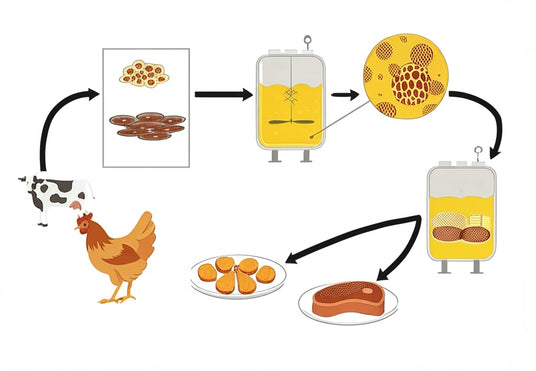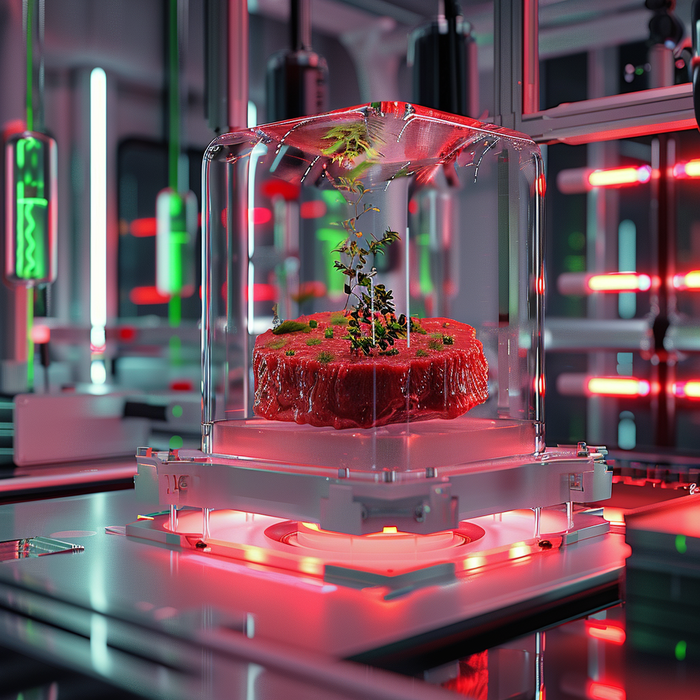
Taste and Texture: Key to Cultivated Meat Success
Does cultivated meat taste like the real thing? That’s the big question for many UK consumers. While cultivated meat is grown from animal cells and aims to replicate the flavour...
Worlds First Cultivated Meat Shop: Read Announcement
Sign up to be the first to know when it's here
Cultivated Lobster is backordered and will ship as soon as it is back in stock.
This Cultivated Lobster brings luxurious seafood indulgence through pioneering cellular agriculture. Developed from lobster cells, each portion delivers the sweet, delicate flavor and distinctive texture that makes lobster the ultimate celebration seafood—produced through cultivation rather than traditional harvesting.
The firm yet tender meat offers that characteristic snap when cooked, while maintaining the sweet, briny flavor notes that make lobster so prized. Each portion delivers an authentic lobster experience with dramatically reduced environmental impact, addressing critical concerns about traditional harvesting methods. Whether enjoyed simply with drawn butter, incorporated into pasta dishes, or featured in elegant bisques, this cultivated lobster represents a revolutionary advancement in sustainable luxury seafood.
Cultivated meat represents the natural evolution of food technology. By isolating animal cells and providing them with the perfect nutrients and environment to grow, producers create real meat identical in taste, texture, and nutritional profile to conventional meat - but without the ethical compromises. This isn't alternative protein; it's meat, reimagined for a sustainable future.
Traditional animal agriculture requires vast resources - land, water, feed - and produces significant greenhouse gas emissions. Cultivated meat transforms this equation dramatically, requiring up to 95% less land, 78% less water, and producing up to 92% fewer carbon emissions. By choosing cultivated meat, consumers make a powerful choice for planetary health while enjoying the foods they love.
Perhaps the most compelling benefit of cultivated meat is what it eliminates: animal suffering. No animal needs to be raised in confined conditions or slaughtered to produce cultivated meat. Producers simply take cells (usually through a painless biopsy) and grow them in controlled conditions. The result is clean, contaminant-free meat produced without antibiotics, growth hormones, or the ethical challenges of conventional meat production.
Yes, cultivated meat is 100% real meat, identical at the cellular level to conventional meat. It contains the same proteins, fats, and nutrients - it's simply grown differently.
Cultivated meat tastes exactly like conventional meat because it IS meat - with the same cellular structure and composition. Many tasters cannot distinguish between cultivated and conventional meat in blind taste tests.
Absolutely. Cultivated meat is produced in controlled environments, eliminating risks of contamination, pathogens, and antibiotics found in conventional meat. Every product undergoes rigorous safety testing and meets strict regulatory standards.
Cultivated meat has already received regulatory approval in countries like Singapore and the United States, with more countries advancing through their approval processes. By pre-ordering through Cultivated Meat Shop, you'll be first in line when products become available in your region - and you'll help demonstrate consumer demand to regulators worldwide. We're closely monitoring global developments to bring these revolutionary products to your table as soon as they're approved.
No. Cultivated meat uses cells taken directly from animals without genetic modification. The cells naturally multiply as they would in the animal's body - they simply require the optimal environment for growth.
Currently, cultivated meat costs more to produce than conventional meat, but prices are decreasing rapidly as technology scales. By pre-ordering and supporting early adoption, you're helping accelerate this price reduction while securing your place as a pioneer in sustainable food.
Yes. Cultivated meat contains the same proteins, fats, and micronutrients as conventional meat. In fact, the nutritional profile can be optimized during production to potentially enhance certain health benefits.
While plant-based alternatives attempt to mimic meat using plant ingredients, cultivated meat IS meat - grown directly from animal cells. This means it provides the complete sensory and nutritional experience of meat without compromise.



